- Home
- Jessie Haas
Westminster West Page 12
Westminster West Read online
Page 12
“Stay here, George,” Father suggested. “That’d be easiest.”
“You don’t need overnight company, David! Not with a sick girl in the house.”
An embarrassed silence followed his words, hanging in the air like smoke. What a strange thing to say, Sue thought. As if Clare taking to her bed were the biggest thing that had happened.
But this was the fourth barn fire. You could almost get used to them. The odd behavior of the Gorham girls stood out, by contrast, as something that had never occurred before. People would wonder. People would talk. In the faint glow from the embers Father’s face had a stricken, paralyzed look, and all the men looked down at their feet.
“I’ll give you a bed, George,” Senator Cutting said, and the group broke up in relief.
26
FRIDAY’S GRAY DAWN found Sue awake, with the smell of smoke and burned wool in her nostrils and a deep, grinding ache in her right hip and leg. She had dreamed she was caught in a bear trap.
She sat up, and everything else hurt, too: her back and all down her ribs, her groin, her arms. She looked at herself under the covers. Had she turned black-and-blue overnight? No, her body was white, as always, with no visible sign of what it had been through.
The house woke up. Sue heard Father speak to Ed and Henry in the yard, the coffee grinder. Then, cutting through burned wool, the scent of frying bacon. Gradually, straightening one set of joints at a time, Sue stood up. Her feet didn’t hurt, that was something! She belted on her dressing gown and hobbled down the stairs.
Mother was flying around getting breakfast. She gave Sue one keen look and placed her at the stove to mind the bacon. The heat penetrated to her bones, the bacon popped and sizzled, and Sue turned it carefully so it didn’t crisp too much. “Where did we get bacon?” The last of their own had been used up in July.
“Mrs. Holden sent it,” Mother said. “The things people have sent—you’d think the house had burned, instead of the barn! Look at this!” She held up a jar. “If Eliza Coombs didn’t send back the preserves I gave her this summer!”
Sue smiled, remembering butter, preserves, even mutton going from their own pantry to the Drislanes and Campbells and Uncle Mathew.
Father and the boys came in with the milk. Mother was making up a tray. Henry asked, “What’s the matter with Clare now?”
“Headache,” Mother said in a clipped voice, and Henry let out a sigh of disgust. Sue looked down to avoid catching anyone’s eye. Henry’s reaction was so simple he seemed like a child. But everyone else was silent, absorbed in private thought.
After breakfast Ed walked out with George Metcalf and sketched the track. The constable rode away with the piece of paper in his pocket.
A telegraph came from the insurance company, and Harlow’s sawmill sent over a load of boards. “Pay me when you get darned good and ready,” Henry Harlow told Father. He offered the loan of his son and of Herb Phillips, who was working for him at the moment. Between them they could knock up a shed in a couple of days.
“Herb Phillips,” Henry muttered. “You don’t think—”
“Herb’s a good man,” Father said. “Don’t let this poison your mind toward your neighbors, son.”
But none of them could help suspecting someone, and each neighbor stopping by during the day had a list. Alonzo Codding. Charlie West. Herb Phillips. Johnny Coombs. Young men who didn’t have much, who might be resentful of those who did, each carrying a chip on his shoulder where someone in town was concerned.
“Wait,” Father said to every suspicion. “Maybe George will have some news.”
Meanwhile, moving slowly, Sue swept, and dusted, and wiped off the soot that had settled on everything in the house. If only she had been let alone to do that, she could have been perfectly happy. It was such a pleasure to be useful, to handle the broom, to touch all the family possessions after her long absence. Just to walk from room to room, glance out the windows at the grazing animals and the surprising heaps of smoking ash.
But every visitor wanted to see her and exclaim. She was like someone in a novel, a pale invalid raised from her bed by galvanizing danger. People seemed to set her miracle cure against the threat everyone felt, as if it balanced things out. Every marveling word struck a tender place inside Sue.
Was there a glimmer of suspicion on some faces, an inkling that this dramatic story wasn’t really plausible? Sue looked hard for it, but overwhelmingly people seemed to feel only wonder and admiration.
The person Sue dreaded most was Aunt Mary Braley, and of course she came, walking into the kitchen with a basket on her arm and a bright expression on her face. She embraced Mother without a word and pushed the basket into her hands.
Then she turned to Sue, and a smile broke over her face. “It is true! I didn’t dass believe it when I heard!” She folded Sue into a warm hug and then stood back, looking at her.
Sue forced herself to meet the old woman’s eyes. She could feel the warm blush creeping up her face.
“There!” Aunt Mary said after a minute, giving Sue’s hands a squeeze. “You’re where you belong to be, and that matters more than how you got there.
“You’ll be thinkin’ it’s easy for the old woman to be cheerful about other people’s troubles,” she went on, turning toward Mother, “but I’ve had very comfortable news of Laura this mornin’ and I’d be smilin’ if ’twas my own barn. Now I know you don’t need that mincemeat, but put it down cellar to please me!” She took up a rag as she spoke and went to rubbing the pewter plates as if in her own house. “Did you get your dried apples put away before this happened, Janey? That was all I could think about when I heard, and I stayed up past ten o’clock last night gettin’ mine off the kitchen ceilin’ and into a box.”
“I got most of them, and the hogs got the rest.”
“I tucked a few in your basket, just in case,” Aunt Mary said. “And how’s Clare? ’Bout as well as could be expected?”
Mother didn’t answer for a moment. Then she said, “Yes, Aunt Mary, she’s about as well as could be expected.”
Just at suppertime George Metcalf returned. His shoulders slumped wearily, and his eyes were so sober that Sue knew he’d found something. He waited to tell until a place had been set for him at the table, a plate filled, and he’d taken a first appreciative bite. Then he sighed and met Father’s eyes.
“Johnny Coombs. Buxton patched that boot for him a couple of months ago.”
Father closed his eyes.
The constable said, “I went down to Jo Harris’s, just in case, but Otis was pretty sure.”
“I don’t see it,” Father said. “Everyone that’s lost a barn was a friend of Tolman’s. What could Johnny have against his father’s friends?”
“Did he have any reason to leave a track behind that bush?” George Metcalf asked.
“Well …” Father paused, and when he went on, his words came more slowly. “He came to look at pigs a few days before the fire. Said he might buy one—”
“And went all through the barns, didn’t he?” Henry snapped.
“You don’t need to go through a barn to know how to burn it.”
“Why would he go behind a bush,” Henry asked, “if all he came for was to look at a hog?”
“Son, sometimes a man does need to step behind a bush,” Father said with the barest suggestion of a wink.
Metcalf looked around the table. “I’d rather this didn’t get around if you don’t mind. Buxton’ll keep it to himself—because the truth is, one track and a horse shying isn’t real evidence. I can think of ten explanations—”
“Name one!” Henry said.
George Metcalf looked steadily at him, not speaking.
“Then it’s not proof?” Father asked almost hopefully.
“Not all by itself. We’ll just have to keep our eyes open.”
“Let’s hope nobody loses a barn in the meantime,” Henry growled.
27
ON SUNDAY SUE STAYED HOME with Clare. Sitti
ng was still painful. She could never have made the two-mile trip to church, even with a cushion.
The house seemed quiet when the wagon was gone. The beans bubbled in their pot; the kettle hummed; the bright sun shone in across the geraniums on the windowsill and gleamed off the plates and glasses, all set on the table for dinner.
No sound came from the back bedroom. Sue hobbled up the stairs, one slow step at a time. This is how I’ll walk when I’m a fat old lady, she thought.
The red book still lay in the back corner of her closet. She picked it up and stood weighing it on her palm. Really, Father’s privacy would be best assured if she burned it. She should take it straight downstairs and put it in the range.
But Father could have done that himself, back when the words in the diary were raw. He had hidden the book, not destroyed it. What if he wanted it someday? What would he think if it were gone? Quietly she let down the attic ladder, and very slowly she climbed it.
In the attic she paused in the beam of light from the window and opened the red book at random. It fell open where it had stood open most often, the last written page. “What do you think I am?”
The words seemed to stagger across the page, expressing Father’s bewilderment. What happened next? That question kept Father in Westminster West, got him married, brought them all into the world, but what was the answer?
There is no answer.
Sue sat on the rounded top of the trunk. There is no answer. What Father thought of Mother was one wrong thing—or if not wrong, then incomplete. What Mother had thought of herself was also incomplete. The night of the fire, when she’d seen what she’d made of Clare, she had understood that. You could never truly know someone else; Sue had long suspected that. Now it seemed that you couldn’t quite know yourself, either. The heart had its own hidden motives.
Then what do you do? How do you live? Sue looked down at the trunk. When she’d last been up here, the only thing she’d wanted was to leave. But she knew so little about Westminster West, even now. Going out to the wider world would mean starting all over again. She had to go deeper here first.
And what about Clare? She had seen the wider world. Like Father, she’d come back full of damaging ideas. Like Father, might she be awakened? Was there some way?
Sue had barely seen Clare since the night of the fire. Mother carried the trays and did the sickroom chores, and it was from Mother that Sue had picked up a feeling of defeat, a sense that Clare would stay in bed, that this was the shape of the years to come. But Mother could be mistaken.
The dent and scratch on the book’s leather cover showed Sue how to wedge it beneath the rafter so it looked as if it had never been moved. She got herself down the ladder, shook out her skirts, and went to Clare’s room.
Clare lay propped on the pillows. Her hair was done up prettily in a Grecian knot, and she was reading. The back bedroom was very quiet. Not even the purr of the teakettle reached here, or the tinkle of a sheep bell.
“Clare,” Sue said. Her heart knocked hard on the wall of her chest. Clare looked up. “Clare, how do you feel?”
“I’m all right,” Clare said, on a faint note of surprise.
“Clare …” She must be very careful; she must not make Clare angry. “Clare, what—what happened Thursday night? Did you come outside? Did something hurt you?”
Clare’s face slowly reddened. She looked stubbornly at the pages of her book. Keep quiet, Sue told herself. Wait.
“I … no. I didn’t go out.”
Wait.
“I felt … terribly faint,” Clare said.
Sue closed her lips against a passionate surge of protest. Faintness was unchallengeable. Especially by her.
Clare said, “I’m not like you, Susie!” Her voice was quicker, sharper. “Everybody keeps saying, ‘Sue can do anything.’ Well, I can’t! I’m no heroine!”
Tell her, Sue thought. I was well for nearly a month. I could have come down, but I knew what you’d do. And I was right. I was right.
She couldn’t say it. A barrier in her throat seemed to prevent the words from coming. Clare was looking at her with perfect sureness in her wide blue eyes. Clare knew exactly what she was, what Sue was.…
“Clare.” She had to push her voice out, and it would not say what she should say. “Clare, there are other ways. You don’t have to stay in Westminster West just because the Campbells aren’t going to Boston.”
Clare lifted her brows in that new, plaintive way she’d picked up in the mountains. “Sue, you’re sounding foolish, and it makes my head ache.”
“Clare, don’t!” Sue’s voice sounded loud in the still room. “Don’t do this!”
“Do this? Do this? What do you mean, Susie? Do you think I’m faking?” There was more color in Clare’s face than Sue had seen in weeks. “You said that once before, you know. I wonder what put it in your head!”
Tell her. It was the one thing that might shock Clare out of her course.
But then Clare would always know. She would always have that power, and the wrong Sue had done would never again be hidden.
Seeing Sue silenced, Clare went on. “I don’t see that I’m to be blamed for having a more delicate system than yours! It’s not my fault I’m not like you!”
You are like me, Sue thought, gazing at Clare’s pretty, firm-jawed face on the pillow. You’re so much more like me than I ever dreamed!
The clock struck the half hour, one soft, heavy, resonant chime. It seemed to strike within Sue’s heart, too, as solid and physical as a blow. She turned away from Clare without another word.
There was no barn to hide in. For the first time Sue truly felt the loss as she stood on the front step with tears running down her cheeks.
She sank onto the step and pressed her face against her knees, forcing her sobs to be silent. The hard stone hurt her aching bones, and that felt right.
The tears didn’t last long. Sue wiped her eyes and blew her nose. She could smell the beans drying out, but a great weariness kept her sitting on the steps for several minutes longer.
She had put away the diary feeling so much older, so full of understanding. She would go to Clare, she would ask a magic question, and everything would be all right. How silly and childish that seemed now! How foolish she had been!
Yet if it had worked, it would have been wise. If Clare had been different. If she had been different. If she had dared tell Clare the truth.
But even that might not have changed anything. Clare had imagined she could be part of Julia Campbell’s world. Absurd, but it wouldn’t seem that way to Clare. She had been treated like a princess for years, invited into the Campbell household twice. Her hopes must have seemed reasonable. If Mother had guessed, she might have nipped them in the bud. But no one had guessed.
Now, thwarted, Clare fell back on her only other acceptable plan of life. Perhaps she did have headaches. Perhaps she was even faint. The mind could trick the body, Sue knew that. But whatever trickery was going on, it would last a long time. If Clare couldn’t leave Westminster West on her own terms, she wouldn’t leave at all.
And I won’t leave either, Sue thought. Clare had trapped them both.
That realization seemed to suspend all thought. Sue just sat, seeing the smooth yellow-green hill stretch up toward the sky, sunlight gleam off the black, shining char of the burned timbers. A blue jay perched there, head cocked. Now it drifted with swift, miraculous lightness to the ashes to peck at a cinder.
28
THE NEXT SUNDAY Sue went to church.
It might have been the same trip she’d made in June, except that Clare’s seat, and Mother’s, were empty. Sue hadn’t quite realized how the whole family was never together anymore.
“World look good to you, Susie?” Ed asked, and she jumped.
“Yes,” she said, beginning to take it in.
The trees were bare now, the whole landscape turned yellow and brown and stark. Frost glittered in the shadowed places. Houses that had been hidden behind the
leaves for six months were plainly visible. High on Perry Hill the gray Coombs house looked like an abandoned wasps’ nest. Below it the new Campbell hay barn stood out fresh and yellow.
Deacon Buxton passed, and the Millers came up behind. Bright and Lucky would not let them by, but Father paid little attention to the game. Sue twisted on her seat and looked back at the lively family in the wagon, and baby Bertha waved.
When they drove into the churchyard, it was plain that something had happened. Angry faces, frightened faces, a cluster of people around George Harlow and his wife, touching and consoling them.
“I told you!” Henry said. “I said we shouldn’t wait!”
“Henry,” Father said, “shh.”
Ed helped Sue down from the wagon, and she went over to Minnie and her family, five freckled little sisters in descending sizes, like a set of organ pipes. “What happened?”
“Two of their barns burned yesterday, ten o’clock in the morning.” Minnie looked sober, standing beside her anxious father. “He’s getting bolder. It’s the first time he’s burned something in broad daylight.”
All through the sermon everyone’s eyes were on the person in the next pew forward; everyone’s ears seemed to strain to hear a whisper from the person behind, the person beside.
After the service the young men clustered in the churchyard, in knots that seemed to shiver and vibrate with strain. Their eyes had a challenging, dangerous brightness, and they watched one another as they spoke. Sue heard talk of dogs, of slow matches, and detectives.
The suspects were as much in the thick of it as anyone. Alonzo Codding, Charlie West, Herb Phillips, young men with no families, no connections, hardly anything of their own. They had always been well liked, but really, who knew anything about them? They had no parents here to stand behind them, no known histories and genealogies to turn over and examine, as everyone else’s history had been examined.

 Chase
Chase The Sixth Sense
The Sixth Sense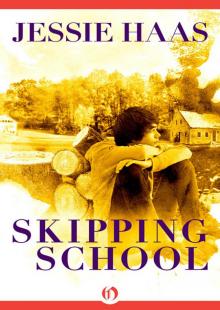 Skipping School
Skipping School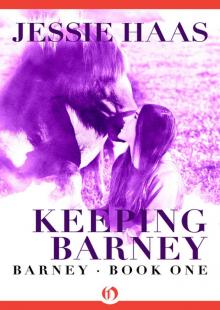 Keeping Barney
Keeping Barney Unbroken
Unbroken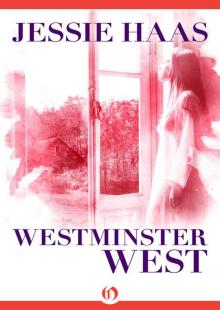 Westminster West
Westminster West Saige
Saige Beware the Mare
Beware the Mare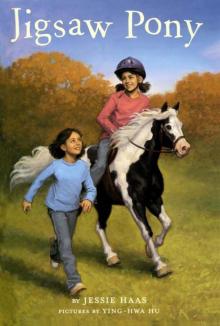 Jigsaw Pony
Jigsaw Pony Rescue
Rescue Saige Paints the Sky
Saige Paints the Sky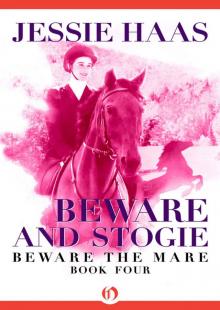 Beware and Stogie
Beware and Stogie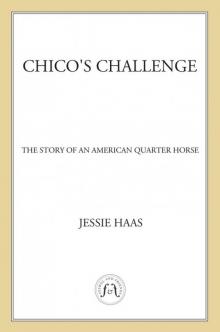 Chico's Challenge
Chico's Challenge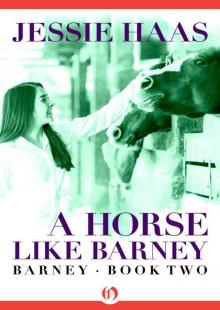 A Horse like Barney
A Horse like Barney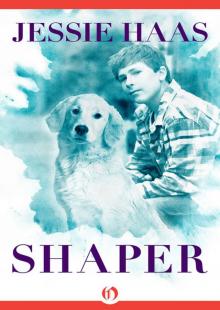 Shaper
Shaper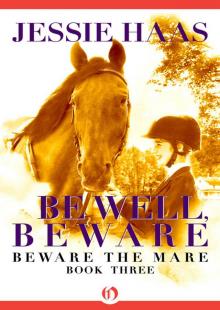 Be Well, Beware
Be Well, Beware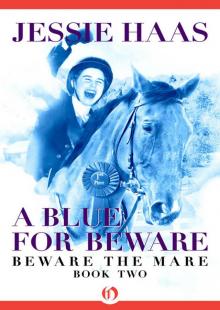 A Blue for Beware
A Blue for Beware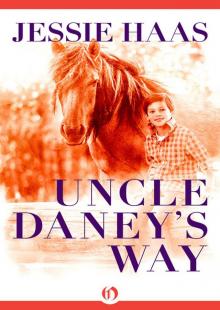 Uncle Daney's Way
Uncle Daney's Way